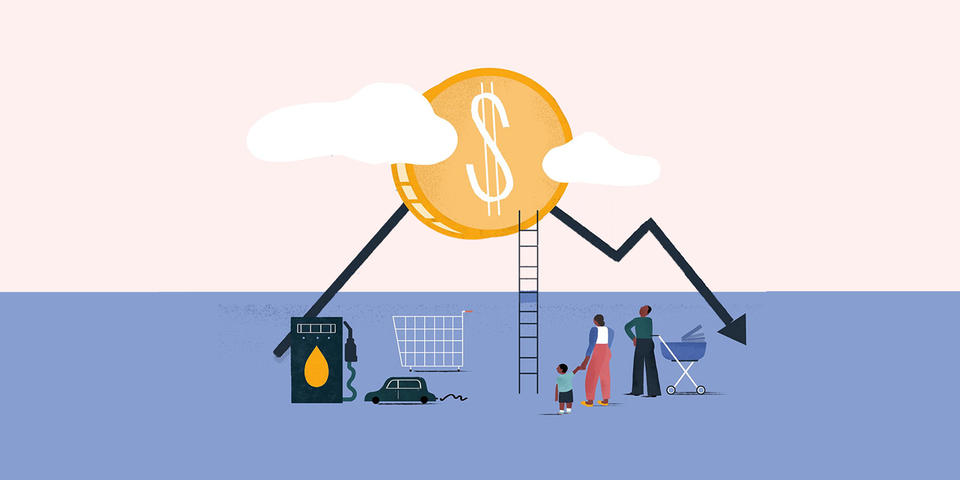How Does Inflation Impact the Stock Market?

Inflation is an economic term that refers to the increase in the price of goods and services over time. It is measured by tracking the Consumer Price Index (CPI) and is a key economic indicator that impacts many aspects of the economy, including the stock market.
Inflation has a significant impact on the stock market, as it can affect company profits, valuations, investor sentiment, and more. In this blog, we will explore how inflation impacts the stock market and what investors should consider when making investment decisions in an inflationary environment.
Interest Rates
Inflationary pressures can lead to higher interest rates, as central banks may raise interest rates to curb inflation. Higher interest rates can increase borrowing costs for companies, which can negatively impact their profits and increase their debt repayment obligations. This can result in a decline in stock prices for companies that rely heavily on debt financing.
Company Profits
Inflation can impact the profits of companies in several ways. Companies may face higher input costs, such as wages, raw materials, and energy, which can reduce their profitability. However, companies that can pass on these costs to their customers through price increases may be less affected by inflation. For example, companies in the energy sector may benefit from higher oil prices as they can charge more for their products.
Valuations
Inflation can also impact stock valuations. High inflation may lead to a decline in the value of money, which can result in higher price-to-earnings (P/E) ratios for stocks. This is because investors may be willing to pay a higher price for stocks in anticipation of higher future earnings. However, if inflation persists, it can lead to a decline in the real value of earnings, which can result in a decline in stock prices.
Sector Performance
Different sectors may be affected differently by inflation. Some sectors, such as utilities and consumer staples, may be less affected by inflation as their products or services are necessities that people continue to buy, regardless of the price. However, other sectors, such as technology and consumer discretionary, may be more affected by inflation as their products or services are more discretionary and sensitive to price changes.
Investor Sentiment
Inflation can also impact investor sentiment. Higher inflation may lead to concerns about the future direction of the economy, which can result in a decline in investor confidence and a subsequent decline in stock prices. This can create opportunities for long-term investors who are willing to hold their investments through short-term market volatility.
Conclusion
Inflation has a significant impact on the stock market. Investors should consider the potential impact of inflation on interest rates, company profits, valuations, sector performance, and investor sentiment when making investment decisions. Long-term investors who focus on fundamental analysis and have a diversified portfolio of investments may be better positioned to weather inflationary periods and achieve their investment goals over the long run.
FAQ
1. What is inflation? Inflation is an economic term that refers to the increase in the price of goods and services over time. It is measured by tracking the Consumer Price Index (CPI) and is a key economic indicator.
2. How does inflation impact the stock market? Inflation impacts the stock market by affecting company profits, valuations, interest rates, sector performance, and investor sentiment. These factors collectively influence stock prices and investment returns.
3. How do interest rates relate to inflation? Inflationary pressures can lead to higher interest rates, as central banks may raise rates to curb inflation. Higher interest rates increase borrowing costs for companies, negatively impacting their profits and debt repayment obligations, which can lead to a decline in stock prices.
4. How does inflation affect company profits? Inflation can increase input costs such as wages, raw materials, and energy, reducing profitability. Companies that can pass these costs on to customers through price increases may be less affected. Some sectors, like energy, may benefit from higher prices.
5. What is the impact of inflation on stock valuations? High inflation can lead to higher price-to-earnings (P/E) ratios as investors anticipate higher future earnings. However, if inflation persists, it can reduce the real value of earnings, potentially leading to a decline in stock prices.
6. How do different sectors respond to inflation? Different sectors are affected differently by inflation:
- Utilities and Consumer Staples: Less affected as their products are necessities.
- Technology and Consumer Discretionary: More affected as their products are more discretionary and sensitive to price changes.
7. How does inflation influence investor sentiment? Higher inflation can lead to concerns about the economy's future direction, resulting in a decline in investor confidence and stock prices. This can create opportunities for long-term investors willing to hold through short-term volatility.
8. What strategies can investors use to mitigate the impact of inflation? Investors can focus on:
- Fundamental analysis to select companies with strong financial health.
- Diversifying their portfolio across different sectors and asset classes.
- Considering investments in sectors less affected by inflation, such as utilities and consumer staples.
9. Can inflation have any positive effects on stocks? In some cases, companies in sectors like energy may benefit from higher prices, leading to increased revenues. Additionally, stocks in companies that successfully pass increased costs to consumers may maintain or grow their profitability.
10. What should long-term investors focus on during inflationary periods? Long-term investors should focus on maintaining a diversified portfolio, conducting thorough fundamental analysis, and staying patient through market volatility. This approach can help them weather inflationary periods and achieve long-term investment goals.






Member discussion